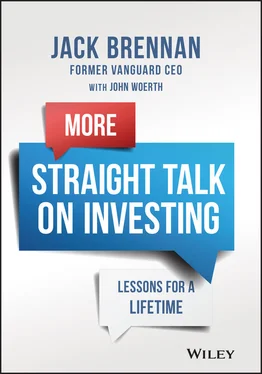Be Disciplined: Develop Good Habits
The second key characteristic of successful investors is that they develop good habits. You can start out with the very best investment plan and still end up disappointed if your own behavior undermines your plan. And the first and most important habit to develop is saving money. You simply cannot spend every penny you earn if you hope to accumulate wealth. The sooner you start saving, the better. When people ask me for my best financial advice, I have only one answer: Live below your means.
Saving is so important—and for many, so difficult—I am devoting Chapter 4to the topic. In this chapter, we'll examine the other good habits you'll need for managing your investments. But as you read them, keep in mind that your first priority is a disciplined saving (and, eventually, investing) program. There is nothing that will put you on a sounder footing for success.
Baseline Basics: Saving, Savings, and Investing
In this book, when I refer to saving , I mean the activity of putting away money. Some consider savings as the remainder of one's money after meeting spending commitments. I want to teach you to be more deliberate in your saving approach. Savings , generally speaking for our purposes, refers to money earmarked to a bank account, CD, or money market fund. Investing means committing money to the financial markets.
In managing your investments, what matters most is how much buying and selling you do. The choice is pretty simple: Either you are a buy-and-hold investor or you are a trader. If you are a buy-and-hold investor, then once you have done your homework and set up an investment program, you just live your life. Yes, you'll want to monitor your investments on a regular basis, but you won't be inclined to make meaningful changes unless something major happens to alter your circumstances, such as a job loss, birth of child, or retirement. Or, there is a legislative or regulatory change that could be beneficial or detrimental. The introduction of the Roth IRA in 1997 is a good example.
Traders—even those who think they're being cautious—are risk-takers. They believe they can turn quick profits or avoid big losses by pouncing on fleeting opportunities in the markets. Traders spend an inordinate amount of time deciding when to get into some investment and when to get out. They aim to invest when they expect stock or bond prices to go on a run, and they sell out when they think prices are about to fall. This approach is known as market timing .
What makes the odds for market-timers so long is something that few seem to think much about: You have to be right at least twice. You need to know the right time to get in and the right time to get out. Some people may succeed at it in the short run, but it's extremely rare to hear of anyone winning at it over a period of years. It brings to mind the old Wall Street joke: “If you want to make a small fortune, start with a large one and trade a lot.”
Another consideration is taxes. You have to pay taxes on any profit you make from the sale of securities held in a taxable account. Even if you are smart enough to beat the market through trading activity, taxes are likely to put a big dent in your gains over time. Indeed, taxes can confiscate 10% to 37% of any gain, depending on your tax bracket.
Many academic studies have shown that holding investments for the long term works far better than trying to time the market. I'm a buy-, buy-, buy-and-hold investor, and so are all of the successful investors I know. I firmly believe in committing money on a regular basis to an aggressive portfolio heavily weighted in stocks and holding pat no matter how the markets are performing in the short term. It has worked for me and millions of people like me. If you follow this simple formula—tailored to your personal situation—you'll be successful over the long term, too.
I'll come back to this topic later, but I want to be clear about my convictions up front. Trading is really all about speculating, not investing. If you are a trader, this book isn't for you. Sell it to someone else—or better yet, set it aside. One day you will be ready to read it when you've found out for yourself that frequent trading doesn't work. Traders spend considerable amounts of time and effort on investments but get back less than the buy-and-hold investors who choose to spend their hours on other pursuits—a hobby, exercise, reading, or time with family.
Another habit to cultivate is to resist keeping score too frequently. We're all susceptible to the temptation to check how our investments are doing at frequent intervals, or when the market posts a healthy gain and dramatic decline. Compulsive monitoring isn't worth the effort. It doesn't matter how your portfolio is doing from day to day or from week to week or, really, from year to year. Look at your balance every quarter if you must, but you shouldn't check more frequently. The danger in looking at your portfolio too frequently is that the short-term fluctuations will make you think that you have to take action, when, in fact, your best course is to sit tight. Think about how nervous, novice drivers always oversteer a car because they think they “have to do something” as a driver. With experience, and perhaps an accident or two, we all learn that less is more with respect to activity behind the wheel. I think the instincts are the same.
We'll discuss other good investment habits later in this book, but these are the most important ones:
1 Live below your means (i.e., spend less than you earn).
2 Be a buy-and-hold investor and rebalance periodically.
3 Don't keep score too often.
Many financial services firms have an interest in selling you something. If you are susceptible to the cold call from a broker or financial advisor with a hot tip, pitches about the latest tax shelter, or hype over last quarter's high-performing stock market sector, you can do a great deal of damage to your financial health.
I can't overemphasize the importance of avoiding fads. I've known many investors who have gone to great lengths to do their homework and learn what they need to do to be successful. And I've seen a few of those who did all the right things turn around and make one major mistake. Fads can lead you into great errors, the kind that can wipe out gains achieved through years of patient investing. Successful investors understand that doing the right things is not the only key to success—you also have to avoid big mistakes.
My own investment experience was shaped by a trend in the late 1960s and early 1970s when there was considerable hoopla over the so-called Nifty Fifty—“one-decision stocks” that you could supposedly buy and hold forever. At the time, the 10 largest publicly traded U.S. companies were IBM, AT&T, General Motors, Eastman Kodak, Esso, Sears, Texaco, Xerox, General Electric, and Gulf. They were seen as one-decision stocks because they were world leaders with sustainable business advantages and seemingly would always dominate the market. I remember my parents, who had very little experience with investing, giving me a single share of Eastman Kodak stock for my 16th birthday in 1970 and assuring me I would be able to hold it forever and reap the rewards.
The Nifty Fifty craze lasted until the 1973–1974 bear market dragged the one-decision stocks down with all the rest. As of December 2020, none of those former market titans rank among the 20 largest-capitalization stocks in the United States; three are among the 50 largest. Six of these companies experienced bankruptcy or a merger. Only two outperformed the broad market over the 51-year period.
As for Kodak, it posted a 10.8% loss per year from 1970 to 2020. (Kodak filed for bankruptcy in 2012, and since relisting in 2013, it has lost 76% of its value.) The Standard & Poor's (S&P) 500 Index's return for that period was 10.7%.
Читать дальше












